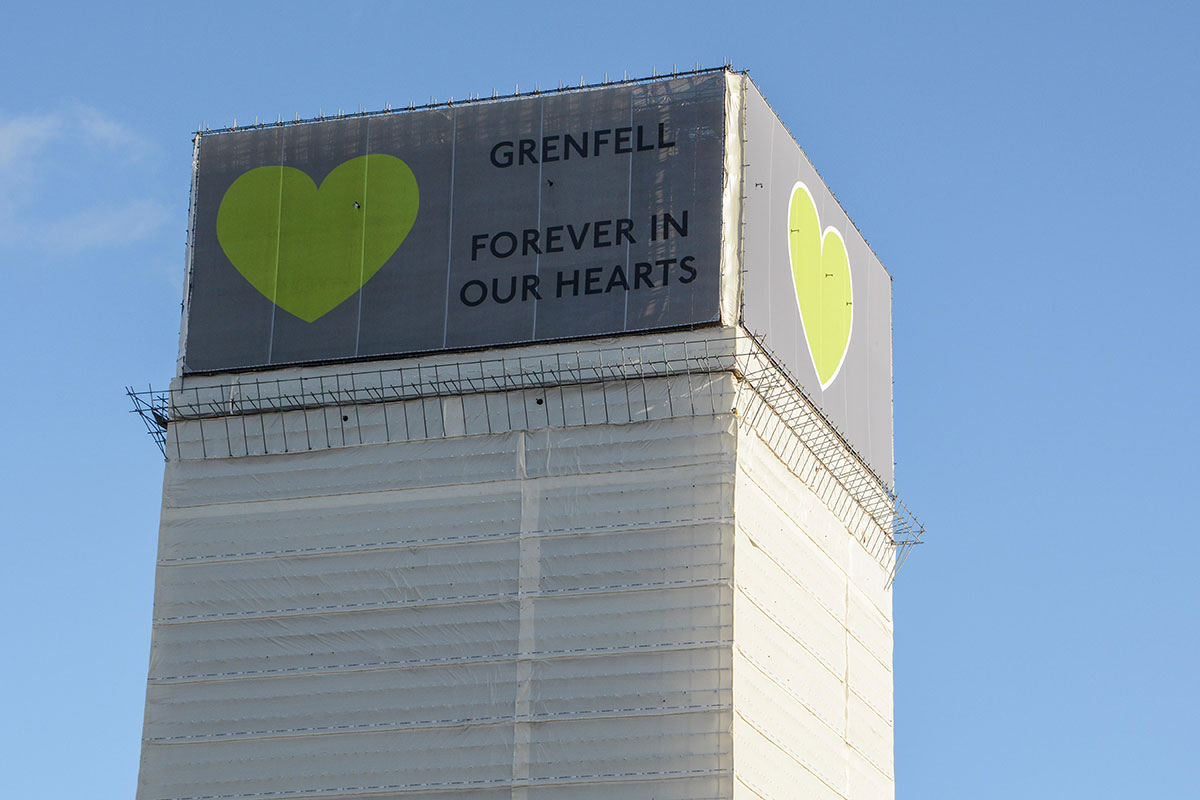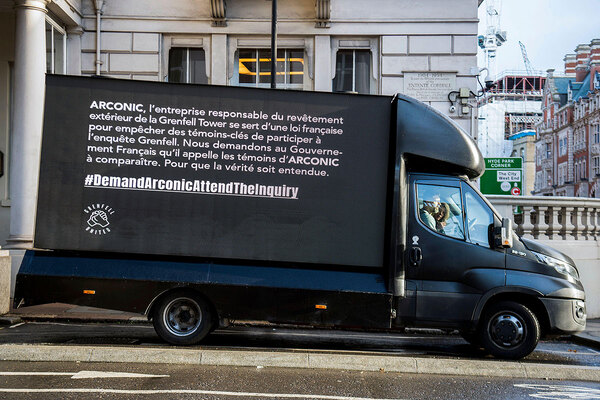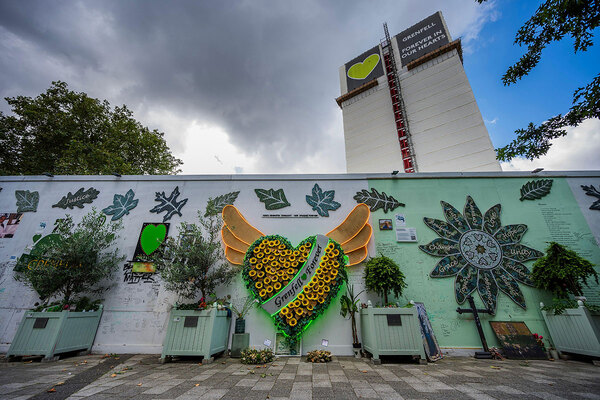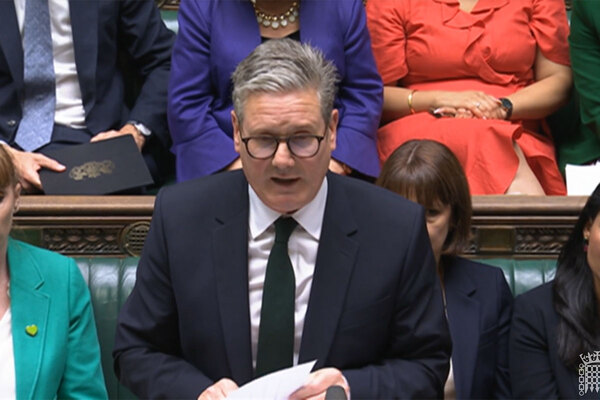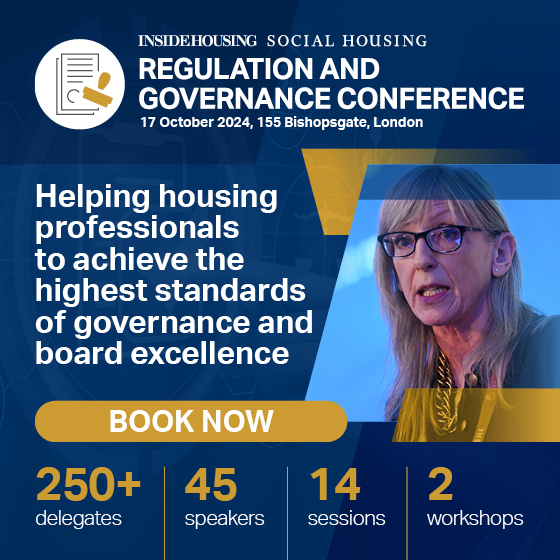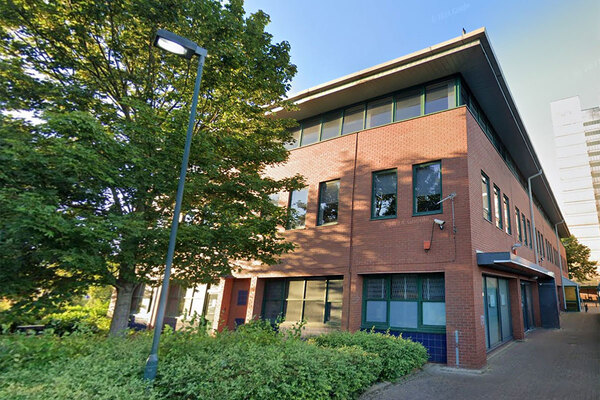You are viewing 1 of your 1 free articles
Failed by ‘incompetence, calculated dishonesty and greed’: reaction to Grenfell Tower Inquiry report
Grainne Cuffe rounds up responses to the second and final Grenfell Tower Inquiry report
The long-awaited Phase 2 report from the Grenfell Tower Inquiry has been published. Below is an outline of how people and organisations are responding to the findings and recommendations in the mammoth document.
The 1,571-page report was scathing in its conclusions. It attacked central government’s failure to prevent the fire despite being “well aware” of the risks and was critical of social landlords for a “serious failure to observe basic responsibilities”.
It said that “systematic dishonesty” by product manufacturers was a “very significant reason” why Grenfell Tower was clad in such dangerous materials.
The section on the manufacturers also contained heavy criticism of various bodies that certified their products such as the British Board of Agrément (BBA), a major and significant player in the construction industry.
It said the “dishonest” strategies of the corporates succeeded “in a large measure due to the incompetence of the BBA… and an ingrained willingness to accommodate customers instead of insisting on high standards”, which had allowed it to become “the victim of dishonest behaviour on the part of unscrupulous manufacturers”.
The report also criticised the Building Research Establishment (BRE) – the former national building science centre for the British government until it was privatised in 1997 – as having “sacrificed rigorous application of principle to its commercial interests”.
The report concluded that Grenfell Tower’s social housing provider, the Kensington and Chelsea Tenant Management Organisation (KCTMO), was responsible for “chronic and systemic failings” in fire safety management, as well as a “toxic” relationship with the tower’s residents who came to regard it as an “uncaring and bullying overlord that belittled and marginalised them”.
The report has made 58 recommendations overall. Many are focused on the construction industry, which if enacted would bring sweeping change to the built environment and will impact social landlords, particularly those which build or manage high-rise buildings.
However, it made no fresh recommendations for social landlords, saying recent legal changes – in particular the Social Housing (Regulation) Act 2023 – are sufficient to drive reform.
Here are the responses to the report as they come in.
Reaction from the sector
Grenfell United, the group representing bereaved family members and survivors of the fire, said “we were failed in most cases by incompetence and, in many cases, by calculated dishonesty and greed”.
It has called on the government to ban Arconic, Kingspan, Celotex and Rydon from central or local government procurement processes.
In a statement, the group said that today marks the conclusion of a “painful six years listening to the evidence of the deaths of 54 adults and 18 children, our loved ones, neighbours and friends”.
It added: “It is a significant chapter in the journey to truth, justice and change, but justice has not been delivered.
“The inquiry report reveals that whenever there’s a clash between corporate interests and public safety, governments have done everything they can to avoid their responsibilities to keep people safe. The system isn’t broken, it was built this way.
“It speaks to a lack of competence, understanding and a fundamental failure to perform the most basic of duties of care.”
It said the recommendations published in the report are “basic safety principles that should already exist”, highlighting how “the government’s roles, duties and obligations have been hollowed out by privatisation”.
“Where voids were created as the government outsourced their duties, Kingspan, Celotex and Arconic filled the gaps with substandard and combustible materials,” it said.
The group said that the duty of the government “should be to safeguard life” while “protecting us from corporate greed”.
“But for too long, they have aided corporations, facilitating them to profit and dictate regulation,” it said.
Grenfell United has called on the government to “exert control over the sector to prevent further dismantling of public safety”.
“To prevent a future Grenfell, the government needs to create something that doesn’t exist: a government with power and ability to separate itself from the construction industry and corporate lobbying, putting people before profit,” it stated.
The group said that above all, the judge “concludes what we already know… that every single loss of life was avoidable”.
It added: “We expect this government to break old habits and implement all of the recommendations made by Sir Martin Moore-Bick [chair of the Grenfell Inquiry] from the inquiry report without further delay, because the time to address this is already three decades too late.
“We are calling on the government to ban Arconic, Kingspan, Celotex and Rydon from central or local government procurement processes, and, finally, start acting in the British public’s interest.
“We have an expectation that the Met police and the CPS [Crown Prosecution Service] ensure that those who are truly responsible are held accountable and brought to justice.
“We must never forget that at the heart of this inquiry report is the fact that 72 people lost their lives.”
Caroline Brosnan, senior associate at Russell Cooke, one of the legal advisors to those affected by the fire, said the bereaved, survivors and residents of the Grenfell Tower “have fearlessly campaigned for transparency and accountability over the injustices that led to the deaths of 72 people”.
She said that while the report is “clear about apportioning responsibility” for the disaster, “some of the recommendations to remedy the situation are not as strong as we would have hoped”.
Ms Brosnan added: “For example, while the TMO and RBKC [Royal Borough of Kensington and Chelsea] are heavily criticised for the way that they treated their tenants and the power imbalance in the relationship is highlighted, the report makes no recommendations because they note that the Social Housing (Regulation) Act 2023 has come into force.
“Although it has started to make a difference, it is a relatively new regime, and one that has already shown that many social housing tenants remain in unsafe housing over seven years after the Grenfell Tower fire and that fire safety is still not consistently maintained in social housing stock.
“That the inquiry should therefore conclude that the Social Housing (Regulation) Act is sufficient is therefore surprising, and means that if monitoring of recommendations is implemented, then the culture of disregard for tenants in social housing will be ignored in that monitoring process.
“An inquiry which was about the experience of being a social housing tenant, is effectively silent on safeguarding the experience of social tenants going forward so that the tenants voice is lost from the process.
“The reality is that thousands of people across the UK still feel unsafe in homes wrapped in combustible cladding and insulation materials, more than seven years on from the events at Grenfell.”
One of the recommendations in the report is that it be made a legal requirement for the government to maintain a publicly accessible record of recommendations made by select committees, coroners and public inquiries together with a description of the steps taken in response.
If the government decides not to accept a recommendation, it should record its reasons for doing so.
Emma Wilson, a principal lawyer at Slater and Gordon, which represented multiple families during the Grenfell Tower Inquiry, said: “Given the failure to respond to earlier recommendations made, we are pleased to see the recommendation that the government be legally required to maintain a publicly accessible record of recommendations made by select committees, coroners and public inquiries together with a description of the steps taken in response.
“We would suggest that this goes further, with the implantation of a National Oversight Mechanism and the creation of an independent public body who would be responsible for following up the recommendations made.”
In response to the report today, Sir Keir Starmer pledged to make sure social landlords are “held to account” for the safety of the homes they provide.
The prime minister also announced that the government would write to “all companies found by the inquiry to be part of these horrific failings as the first step to stopping them being awarded government contracts”.
Fiona MacGregor, chief executive of the Regulator of Social Housing, said the fire was a “profound tragedy and our thoughts remain with the victims and survivors, their families, and the local community”.
She added: “We welcome the inquiry’s final report, and it is vital that all social housing landlords read and learn from the findings that apply to them.
“The lessons from the tragedy remain as important today as they were seven years ago.
“Landlords must ensure tenants are safe in their homes. They must listen to tenants, take their complaints seriously, and treat them with fairness and respect.”
Housing ombudsman Richard Blakeway said: “But it must also act as a moment of reflection for the whole country.
“The survivors and bereaved families who provided such vital evidence throughout the inquiry should be commended; their voices are clearly heard in this report which is testament to how it has been produced.”
He stated that integral to the findings are “respect and trust” and the principles of transparency and accountability.
He added: “It is clear residents’ complaints were dismissed and devalued. While there are technical failings detailed in the report, the gross imbalance of power and dismissal of residents is striking.
“These are some of the issues we still encounter in our investigations and highlighted in our recent systemic report on attitudes, respect and rights. It identified the need for human-centric provision of services by landlords.
“There is a wider societal change that needs to take place towards those living in social housing, stopping the stigma towards this important tenure. This starts with the investment needed so that landlords can deliver services that meet residents’ needs and are able maintain social homes in a way that is responsible and ensures decency.”
Mr Blakeway said that landlords should “rigorously” review the complaints they receive to “drive learning and create a positive complaint handling culture”.
“Landlords should also ensure they are listening and involving residents in their decision making processes, which was devastatingly absent here,” he said.
Kate Henderson, chief executive of the National Housing Federation, said: “We and our members will continue to do everything in our power to ensure that a tragedy such as the fire at Grenfell Tower never happens again.
“The deaths of 72 innocent people were entirely avoidable, and it is right that those responsible are held to account, and that other buildings with the same dangerous safety defects are made safe as quickly as possible.
“We welcome the Grenfell Tower Inquiry’s recommendations and will work with our members to learn the lessons from this report.”
Gavin Smart, chief executive of the Chartered Institute of Housing (CIH), said the report “serves as a sobering reminder of the need to learn from the tragedy” and “ensure that such an event can never happen again”.
He said: “Our focus must be on creating homes where safety is paramount and where resident concerns are treated with the gravitas that they deserve.
“The report highlights critical lessons for all of us working in housing. CIH is committed to supporting our members and the wider sector to improve organisational culture and deliver high standards of safety, accountability, and professionalism.
“As we reflect on the inquiry’s findings we also think of the 72 lives lost at Grenfell and the very personal loss felt by their families, friends and communities.”
In a statement, the Metropolitan Police said the publication of the report is a “significant milestone for those deeply affected by the tragedy”.
Stuart Cundy, deputy assistant commissioner at the Metropolitan Police, said: “The thoughts of the Met are especially with the bereaved, survivors and residents, as well as the wider Grenfell community.
“We remember with much sadness all those who lost their lives. The report is direct, comprehensive and reaches clear conclusions.”
He said the police investigation is “independent” of the public inquiry and “operates under a different legal framework”.
“So we cannot simply use the report’s findings as evidence to bring charges,” he said.
Mr Cundy added: “To secure justice for those who died and all those affected by the fire, we must examine the report – line by line – alongside the evidence from the criminal investigation. As I said previously, this will take us at least 12 to 18 months.
“This will lead to the strongest possible evidence being presented to the Crown Prosecution Service so they can make charging decisions.
“I can’t pretend to imagine the impact of such a long police investigation on the bereaved and survivors, but we have one chance to get our investigation right.
“We will be thorough and diligent in our investigation while moving as swiftly as possible. We owe that to those who died and all those affected by the tragedy.”
London mayor Sadiq Khan said those responsible for the disaster “must now be immediately held to account for their systematic dishonesty, corporate greed, institutional indifference and neglect”.
He said: “For more than seven long years, the bereaved, survivors, residents and local Grenfell community have shown unrelenting strength, dignity and courage in the fight for justice. We all owe them a debt of gratitude.
“While the publication of the second phase of the Inquiry is an important step on this journey, it is not the end.”
He said companies found to have been to blame by the inquiry must no longer receive any public contracts, as the police and CPS look into the bringing of criminal charges.
Elizabeth Campbell, leader of Kensington and Chelsea Council, apologised for the local authority’s “failure”.
She said: “On behalf of the council, I apologise unreservedly and with my whole heart to the bereaved, survivors and residents of Grenfell for our failure to listen and to protect them.
“The inquiry has laid bare the chain of events that led to that night. We fully accept its findings, which are a withering critique of a system broken from top to bottom.
“It shows beyond doubt that this council failed the residents of Grenfell Tower and the 72 people, including 18 children, who died.
“We failed to keep people safe before and during the refurbishment and we failed to treat people with humanity and care in the aftermath.
“We will learn from every single criticism in the report. We will take time to study it further in detail, listen to the reflections from our communities, and publish a full and formal response in the autumn.”
James Small-Edwards, Labour member for West Central at the London Assembly, said: “I, along with all Londoners, stand with the bereaved, survivors and wider community, all of whom are still suffering with the loss and trauma caused on that day.
“The report has made clear that the deaths were entirely avoidable and that 72 innocent people lost their lives due to dishonesty, corporate greed and institutional neglect.
“The report also demonstrates a damning indictment of the deregulation agenda of successive governments. We need to see higher standards from government when they make the rules – along with better behaviour from councils when it comes to listening to tenants.”
Louise Gittins, chair of the Local Government Association (LGA), which represents councils across England, said: “Our thoughts today are with those who tragically lost their life at Grenfell Tower, the survivors and the wider community so profoundly affected by this tragedy.
“It is hard to comprehend the unimaginable loss and trauma so many have experienced following that fateful day – a pain that, unfortunately, will never go away.”
She added the disaster that unfolded “must never be allowed to happen again” and the LGA and councils will “take time to properly consider this vital report and its recommendations”.
“Local government stands ready to work with the government on improving building safety and ensuring no-one has to live in fear about their safety, be that in the buildings they live in, work in or visit,” she said.
Graeme McDonald, managing director of Solace, a membership network for more than 1,600 public sector and local government professionals, said: “The Grenfell Tower fire was one of our most tragic days and our thoughts remain with the victims and their families.
“As today’s final report shows, this uniquely horrific tragedy was avoidable. This included the clear and obvious failure of local government leadership and culture. As a whole sector this is a reminder, if it were needed, of the need to continuously seek and aspire to high standards.
“Now is the time for all of us in local government to properly reflect on the findings of the report and consider necessary change in a thorough, meaningful and sustainable manner.”
Scottish housing minister Paul McLennan said the fire “emphasised how important building and fire safety is”.
“We will carefully consider all of the recommendations in the Grenfell Tower Inquiry’s report… Scotland already has stringent safety regulations to keep people safe, but we are not complacent.”
“Subject to the devolution of the necessary powers, we will establish a Building Safety Levy in Scotland, equivalent to a levy that will be introduced by the UK government in England,” he added.
Henry Griffith, policy and campaigns officer at Propertymark, a professional body for estate agents and lettings agents, said the findings are welcome.
He said: “Despite commitments from the previous government, half a million people continue to live within properties that are known to have serious safety concerns.
“Now that the final report has been published, the UK government must take action to alleviate the myriad of issues that residents in high-rise buildings continue to face. By doing so, we can bring confidence back to the sector, so people can feel safe in their homes.”
The Housing Ombudsman said the report will have a “huge significance” for the way housing operates in the future.
Mike Amesbury, Labour MP for Runcorn and Helsby and new chair of the All-Party Parliamentary Group on Leasehold and Commonhold Reform, said “tens of thousands of residents are still trapped in the daily nightmare of the building safety crisis”.
He added: “We call on the government to take action against all those involved in creating these unsafe buildings, not just the developers but the architects, the contractors and especially the cladding manufacturers who sold products knowing they were unsafe.
“I call upon colleagues in government to implement all recommendations in this report and ensure justice is done by those affected by Grenfell and the building safety crisis.”
Referring to the English regulator’s new powers introduced in the Social Housing (Regulation) Act, Ms MacGregor said: “We will continue with our programme of planned inspections and responsive work and publish gradings for landlords based on our findings.”
Andrew Mellor, partner at PRP Architects and technical advisor on building regulations to the Ministry of Housing, Communities and Local Government, said the inquiry’s recommendation for a single construction regulator is “huge” and “impacts both current responsibilities and those planned for various government departments”.
“While it’s a sensible proposal, it will require a lot of resources to implement. I anticipate it will take at least two years before it can become operational,” he said.
The Federation of Master Builders (FMB) said competence must be embedded “from the ground up”.
Chief executive Brian Berry said: “While the nation’s local builders are, for the most part, far removed from work that has been investigated as part of the Grenfell Tower Inquiry, it does not mean they are precluded from improving industry standards.
“Domestic builders do not have minimum competence levels; they are not a protected profession like plumbers or electricians.
“If the industry and government are serious about delivering competence, then introducing minimum standards for entry into domestic building work is a must – this is competence from the ground up.”
Claire Holland, chair of London Councils, said the report “must serve as a catalyst for action”.
She said: “Boroughs will be reading this report closely to ensure that we understand its findings in full and take action in response to its recommendations.
“Every Londoner has the right to be safe and feel safe in their home. Since the fire, London boroughs have continued working to improve building safety and overall housing standards for people living in high-rise accommodation, but we know there is so much more to do and progress has been far too slow.
“It’s vital that we drive forward the change we need to see, in partnership with our residents and national government, to ensure this clearly avoidable tragedy is never repeated.”
The British Safety Council described the report as “sobering and comprehensive”.
Chair Peter McGettrick said: “Safety must be at the core of any changes, and we need to see an appropriate and proportionate response by all parties which delivers on the recommendations in the inquiry’s report and ensures greater clarity, transparency and professionalism at all levels.
“Progress has been made in the past seven years, especially in terms of new legislation and regulation on building safety and social housing, but there is clearly much more to do.”
Manufacturers’ responses
A spokesperson for Arconic Architectural Products (AAP) said: “The company respects the inquiry process. AAP co-operated fully with the work of the inquiry and will continue to engage with further legal processes. “Together with other parties, AAP has made financial contributions to settlements for those affected, as well as to the restorative justice fund.
“Throughout the inquiry, AAP has maintained a number of points:
-
AAP sold sheets of aluminium composite material as specified in the design process. This product was safe to use as a building material, and legal to sell in the UK, as well as the more than 30 other countries in which AAP customers purchased the product. We reject any claim that AAP sold an unsafe product.
-
AAP regularly conducted tests of its materials using third-party testing bodies. Reports on these results were all publicly available, and AAP made these reports available to its customers.
-
AAP did not conceal information from or mislead any certification body, customer, or the public.”
A spokesperson for Kingspan said: “Today is another extremely difficult day for the relatives and survivors of the Grenfell Tower fire and we extend our deepest sympathies to those impacted by the tragedy.
“We welcome the publication of today’s report, which is crucial to a public understanding of what went wrong and why.
“It explains clearly and unambiguously that the type of insulation (whether combustible or non-combustible) was immaterial, and that the principal reason for the fire spread was the PE ACM [polyethylene aluminium composite material] cladding, which was not made by Kingspan.
“Kingspan has long acknowledged the wholly unacceptable historical failings that occurred in part of our UK insulation business. These were in no way reflective of how we conduct ourselves as a group, then or now. While deeply regrettable, they were not found to be causative of the tragedy.
“Kingspan has already emphatically addressed these issues, including the implementation of extensive and externally verified measures to ensure our conduct and compliance standards are world leading.
“We remain committed to playing a leading role in providing safe and sustainable building solutions, including continuing to work with government and industry partners.”
A spokesperson for Celotex said: “The publication of the Grenfell Tower Inquiry report marks the conclusion of the inquiry’s work and we are considering its contents with care.
“Our business’ response to what happened started immediately after the fire in June 2017.
“We conducted our own review to interrogate the circumstances in which the RS5000 product had been tested, launched and marketed.
“This review was a significant and thorough undertaking, and the results of that work were disclosed promptly and proactively to relevant stakeholders, including the Grenfell Tower Inquiry.
“Independent testing commissioned following the review demonstrated that the cladding system described in the Celotex RS5000 marketing literature met the relevant safety criteria.
“That system was substantially different to that used at Grenfell Tower. Decisions about design, construction and the selection of materials for the Tower were made by construction industry professionals.
“Since the fire, we reviewed and improved process controls, quality management and the approach to marketing within the Celotex business to meet industry best practice.
“Celotex Limited continues to cooperate fully with all official investigations into the Grenfell Tower fire.
“We reiterate our sympathies to everyone affected by the fire.”
All Inside Housing’s breaking stories on the Grenfell Inquiry Phase 2 report
KCTMO responsible for ‘chronic and systemic’ safety failings before Grenfell fire, inquiry concludes
Grenfell’s social housing provider was responsible for “chronic and systemic failings” in fire safety management, as well as a “toxic” relationship with the tower’s residents, who came to regard it as an “uncaring and bullying overlord that belittled and marginalised them”
Failed by ‘incompetence, calculated dishonesty, and greed’: reactions to Grenfell Tower Inquiry report
Inside Housing is highlighting responses to the second and final Grenfell Tower Inquiry report
The Grenfell Tower Inquiry report may not have made recommendations to social landlords, but it is still a major call for change
Today’s Grenfell Tower Inquiry report surprisingly stopped short of making recommendations for social housing providers. But it did ask them to read it and reflect. This is homework which should be taken seriously, writes Peter Apps
Grenfell Inquiry report elects not to make specific recommendations for social housing providers
The Grenfell Tower Inquiry has made no fresh recommendations for social landlords in its long-awaited Phase 2 report, saying recent legal changes are sufficient to drive reform
‘Complacent’ government ‘well aware’ of cladding risks before Grenfell fire but ‘failed to act’
A “poorly run”, “complacent” and “defensive” government department “failed to act on what it knew” about dangerous cladding in the years before Grenfell, amid an enthusiasm for deregulation which “dominated” its thinking
‘Systematic dishonesty’ by product manufacturers ‘very significant reason’ for Grenfell’s deadly cladding, inquiry concludes
“Systematic dishonesty” by product manufacturers was a “very significant reason” why Grenfell Tower was clad in such dangerous materials, the inquiry report into the fire has concluded
Social landlords must be ‘held to account’ for safety of homes, prime minister says
Sir Keir Starmer has pledged to make sure social landlords are “held to account” for the safety of the homes they provide, in a statement following the publication of the Grenfell Tower Inquiry’s second and final report
Sign up for our fire safety newsletter
Already have an account? Click here to manage your newsletters
Sign up to the Regulation and Governance Conference 2024
At a time of major regulatory change, the Regulation and Governance Conference is designed to give board members and governance and risk professionals the insight they need to plan and prioritise effectively.
Join more than 250 delegates and 45 speakers to confidently navigate the change ahead and ensure you have the right governance structures and assurance frameworks to keep tenants safe and run a viable business.
